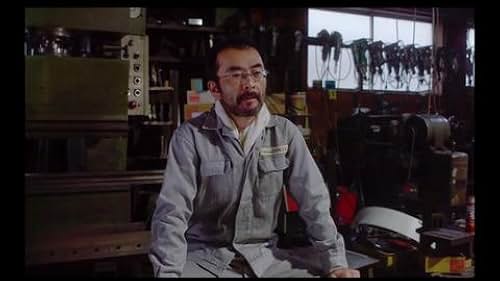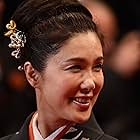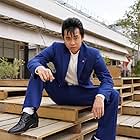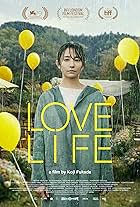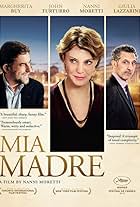Toshio hires Yasaka in his workshop. This old acquaintance, who has just been released from prison, begins to meddle in Toshio's family life.Toshio hires Yasaka in his workshop. This old acquaintance, who has just been released from prison, begins to meddle in Toshio's family life.Toshio hires Yasaka in his workshop. This old acquaintance, who has just been released from prison, begins to meddle in Toshio's family life.
- Awards
- 5 wins & 8 nominations total
- Director
- Writer
- All cast & crew
- Production, box office & more at IMDbPro
Storyline
Did you know
- TriviaThe director Koji Fukada was present at the screening of "Harmonium" at the Ghent Film Festival, where the movie was in the official competition selection. During a Q&A following the screening, he revealed that the Japanese title "Fuchi ni tatsu" could best be translated as "Standing on the edge", but the translation didn't quite have the same nuance. That's why he changed the international title to "Harmonium", referring to the musical instrument, but also because there was the wordplay on "harmony", which is an important element in the film. The use of the harmonium as a characteristic feature was a distinct choice, as the director saw it as a symbol of the traditional Japanese family.
Featured review
The principal flaw of Harmonium directed by Kôji Fukada may be its length. At more than two hours the film is by 20 to 30 minutes longer than the standard, and the extra time is not necessarily best used. Yet, this stylish combination between family drama, thriller and crime story has enough interesting elements in the story, and is so well acted and filmed that it eventually justifies itself and needs not make too many excuses.
We can admire from opening scenes the mastering of the art of describing the characters and the background with very little means, in a few beautifully filmed takes, with even fewer words. We see a family in Tokyo working hard for their living. The father has a metal shop and seems to be an agnostic. The mother is deeply religious and she drives the education of their daughter around ten years old, who tries to learn playing the harmonium. A stranger shows up, he is well mannered, accepted by the father and then by the rest of the family. There are secrets in the relation between the two men, and these secrets of the past will take over the situations that follow.
There are two different parts in the story separated by a jump in time which is one of the several techniques of story telling that are being experimented and combined in a well dosed mix. The story telling is built in a very interesting manner. Two acts of violence happen out of the screen, and viewers as well as most of the characters do not know exactly what happened. The first took place eleven year before the story starts. The second wraps up the first part and triggers the events of the second part, with another gap of eight years. None of them is represented on the screen, the story is not about violence but about its consequences. The final is also open ended, we see what happens, but the interpretation is left to the viewers.
I liked more the first part, with its more constraint setting and only with the four characters present on the screen. The development is necessary in the logic of commercial film making nowadays, the jumps and gaps are intentional, but they lack balance. There is wonderful acting from Mariko Tsutsui in the role of the dedicated mother but also of the feminine presence that triggers passion, and from Tadanobu Asano as the dignified and yet mysterious stranger. This film is not flawless, it lasts too long and its changes of direction may not be on everybody's taste, but it's a good example about how the Japanese school of cinema continues its great aesthetic tradition, how it combines it with the popular culture genres (like thriller and horror stories) and how it looks carefully to new means of expression in an evolutionary rather than revolutionary approach.
We can admire from opening scenes the mastering of the art of describing the characters and the background with very little means, in a few beautifully filmed takes, with even fewer words. We see a family in Tokyo working hard for their living. The father has a metal shop and seems to be an agnostic. The mother is deeply religious and she drives the education of their daughter around ten years old, who tries to learn playing the harmonium. A stranger shows up, he is well mannered, accepted by the father and then by the rest of the family. There are secrets in the relation between the two men, and these secrets of the past will take over the situations that follow.
There are two different parts in the story separated by a jump in time which is one of the several techniques of story telling that are being experimented and combined in a well dosed mix. The story telling is built in a very interesting manner. Two acts of violence happen out of the screen, and viewers as well as most of the characters do not know exactly what happened. The first took place eleven year before the story starts. The second wraps up the first part and triggers the events of the second part, with another gap of eight years. None of them is represented on the screen, the story is not about violence but about its consequences. The final is also open ended, we see what happens, but the interpretation is left to the viewers.
I liked more the first part, with its more constraint setting and only with the four characters present on the screen. The development is necessary in the logic of commercial film making nowadays, the jumps and gaps are intentional, but they lack balance. There is wonderful acting from Mariko Tsutsui in the role of the dedicated mother but also of the feminine presence that triggers passion, and from Tadanobu Asano as the dignified and yet mysterious stranger. This film is not flawless, it lasts too long and its changes of direction may not be on everybody's taste, but it's a good example about how the Japanese school of cinema continues its great aesthetic tradition, how it combines it with the popular culture genres (like thriller and horror stories) and how it looks carefully to new means of expression in an evolutionary rather than revolutionary approach.
- How long is Harmonium?Powered by Alexa
Details
Box office
- Gross US & Canada
- $17,191
- Opening weekend US & Canada
- $3,453
- Jun 18, 2017
- Gross worldwide
- $153,283
- Runtime2 hours
- Color
- Aspect ratio
- 1.66 : 1
Contribute to this page
Suggest an edit or add missing content



